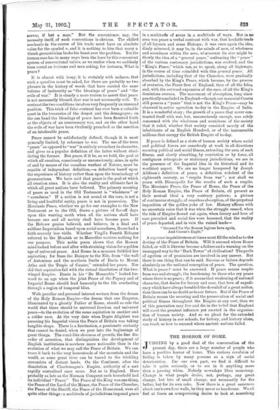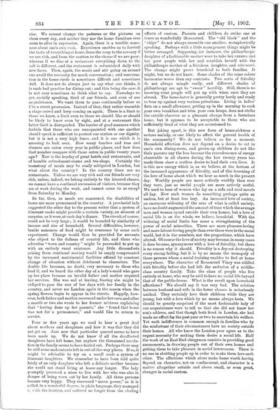THE HORROR OF HOME.
JUDGING by a good deal of the conversation of the present day, there are a large number of people who have a positive horror of home. This curious revulsion of feeling is taken by many persons as a sign of social deterioration. For our own part, we find it difficult to take it quite seriously, or to see in it anything more than a passing whim. Nobody nowadays likes monotony. Change is what people desire, not, perhaps, any great change, but lots of small change, not necessarily for the better, but for its own sake. Now there is a great sameness 'about one's own four walls, be they never so handsome. We all feel at times an overpowering desire to look at something else. We cannot change the patterns or the pictures on them every day, and neither they nor the home furniture ever seem to alter in expression. Again, there is a terrible same- ness about one's own cook. Experience enables us to foretell the taste of everything at home, from the soup to the savoury if we are rich, and from the mutton to the cheese if we are poor ; whereas if we dine at a restaurant everything down to the salt is different, and the restaurant is refurnished daily with new faces. Then, again, the music and stir going on around one avoid the necessity for much conversation ; and conversa- tion in the home circle is sometimes difficult and sometimes dull. It does not do always just to say what one thinks, it is such bad practice for dining out ; and this being the case, it is not easy sometimes to think what to say. Nowadays we get, socially speaking, tired of our friends, and even of our acquaintance. We want them to pass continually before us like a street procession. Instead of that, they rather resemble a stage crowd and keep coming on again. There is a limit to those we know, a limit even to those we should like or should be likely to know even by sight, and at a restaurant this latter limit is disregarded. The barrier of good manners which forbids that those who are unacquainted with one another should speak is sufficient to protect our station or our dignity, but it is not a very high fence, and it is one which it is amusing to look over. How many lunches and teas and dinners are eaten every year in public places, and how does that number compare with those eaten in public twenty years ago P Now is the heyday of great hotels and restaurants, and of humble refreshment-rooms and tea-shops. Certainly the monotony of meals may be easily mitigated in London, but what about the country ? In the country there are no restaurants. Unless we are very rich and our friends are very rich, unless, indeed, we belong entirely to the leisured classes, we cannot have a continual succession of visitors, because they are at work during the week, and cannot come to us except from Saturday to Monday.
So far, then, as meals are concerned, the disabilities of home are more pronounced in the country. A provincial lady suggested the other day to the present writer that a system of itinerant cooks might provide a certain variety, an element of surprise, as it were, at each day's dinner. The circuit, of course, could not be very large ; it would be bounded by similarity of income and size of household. Several difficulties, however, beside sameness of food might be overcome by some such experiment. Change would thus be provided for servants who object to the dulness of country life, and those who advertise "town and country" might be persuaded to put up with an. entirely rural existence. Any little discomforts arising from continual moving would be amply compensated by the increased matrimonial facilities offered by constant change of situation without detriment to characters. The double life becomes, no doubt, very necessary to those who lead it, and we heard the other day of a lady's-maid who gave up her place because an invalid father and mother required her services. She was sad at leaving, fearing she might be obliged to pass the rest of her days with her family in the country, and never see London again in the season when the spring flowers begin to appear in the streets. Happily, how- ever, both father and mother recovered under her care, and after a month or two she wrote to her former mistress explaining that " having done up her parents," she " found that home was not for a permanence," and would like to return to service.
Four or five years ago we used to hear a great deal about mothers and daughters and how it was that they did not get on. Just now that particular quarrel seems to have been made up. We do not know if all the disaffected daughters have left home, but anyhow the threatened revolu- tion in the family seems to have fizzled out Perhaps there may be still some malcontents left in out-of-the-way places. If so, it might be advisable to try on a small scale a system of itinerant daughters. We remember to have been told quite lately of an only daughter who left a delicate mother because she could not stand living at home any longer. The lady promptly procured a niece to live with her who was also in danger of being worn out by her family. All three persons became very happy. They recovered " nerve power," as it is called, in a wonderful degree; in plain language, they managed to s'Aift the friction, and suffered no longer from the chafing effects of custom. Parents and children do strike one at times as wonderfully ill-assorted. The "old block" and the " chips " do not always resemble one another, metaphorically speaking. Perhaps with a little management things might be better arranged. Supposing. for instance, the philanthropic daughter of a fashionable mother were to take her curates and her poor people with her and establish herself with the philanthropic mother of a frivolous daughter, and vice-versa. The change might prove beneficial to both families. It might, but we do not know. Some shades of the same colour harmonise worse than any contrasts. Two sorts of frivolity do not always mingle easily, and different shades of philanthropy are apt to " swear" horribly. Still, there is no knowing what people will put up with when once they are abroad. The home-hater is generally pretty hardy and ready
to bear up against very various privations. Living in ladies' flats on a small allowance, getting up in the morning to cook your own breakfast and trim your own lamps, does not strike the outside observer as a pleasant change from a luxurious home, but it appears to be acceptable to those who are sufficiently tired of what they are accustomed to.
But joking apart, is this new form of home-sickness a serious malady, or one likely to affect the general health of the community ? We do not believe so for a moment. Household affection does not depend on a desire to eat in one's own dining-room, and grown-up children do not like their parents any the less because the recrudescence of energy observable in all classes during the last twenty years has made them show a restless desire to lead their own lives. It is this new energy which is, as we believe, at the bottom of the increased appearance of frivolity, and of this lessening of the love of home about which we hear so much in the present day. Worldly people are more actively worldly than ever they were, just as useful people are more actively useful. We used to hear of women who lay on a sofa and read novels all day. Now such women do something perhaps quite as useless, but at least less lazy. An increased love of society, an enormous widening of the area of what is called society, have no doubt augmented the amount of time which the average man and woman spend outside their own homes, but a love of social life is on the whole, we believe, beneficial. With the widening of social limits has come a strengthening of the power of social minorities. There are more pleasure-loving and more labour-loving people than ever there were in the social world, but it is the numbers, not the proportions, which have altered. Of course the love of society may become, in many cases it does become, synonymous with a love of frivolity, but there is no reason why it should. Frivolity is a dry-rot destroying every strong feeling, but it is by no means the monopoly of those persons whom a social training enables to feel at home everywhere. The character of Rosamund Vincy was riddled with frivolity before she had left the seclusion of a middle- class country family. Take the class of people who live entirely at home, who may be said to have no social life beyond that of the public-house. What is the result upon household affections ? We should say it was very bad. The relation between husband and wife in the lower classes is notoriously unideaL They certainly love their children while they are young, but with a love which by no means always lasts. We should be greatly surprised if the most fashionable lady of our acquaintance were to tell us that she did not know her son's address, and that though both lived in London, she had made no effort fer the past year or two to ascertain his welfare. Yet such indifference is common enough in families who by the misfortune of their circumstances have no society outside their homes. All who know the London poor agree as to the urgent necessity for making them desire a social life. Half the work of an East End clergyman consists in providing good amusements, in drawing people out of their own homes and getting them to take pleasure in social intercourse. There is no use in shutting people up in order to make them love each other. The affections which alone make home worth having depend on character, not on confinement, and character is a matter altogether outside and above small, or even great, changes in social custom.











































 Previous page
Previous page